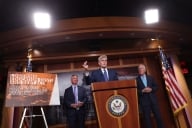You have /5 articles left.
Sign up for a free account or log in.
The COVID-19 pandemic may prove to be one of the most profound global crises of our time. Every day seems to bring another unprecedented development, including mass closures of educational institutions and businesses, city- and statewide orders requiring millions of people to stay in their homes, and the disruption of financial markets. Last week, more than six million Americans applied for unemployment, while the number of U.S. infections surpassed those of all other countries in the world.
In the midst of such intense upheaval, it can be difficult to maintain confidence in our collective ability to respond, to prevent widespread infection and deaths among our most vulnerable populations, to stabilize our economy, and to return our lives to normalcy.
But as unnerving as this moment is, we do have optimism that a clear path forward for the U.S. and the world can be identified. Our nation’s public research universities are one resource that can help light the way.
Today, thousands of doctors, researchers, physician scientists, students and trainees at academic institutions across the United States are working around the clock to develop and test innovative ways to prevent infection, to treat patients who develop COVID-19 and to end the pandemic.
Researchers across the University of California and our associated health centers are now engaged in more than 300 research initiatives designed to combat COVID-19. Five of our health centers are pursuing clinical trials testing the safety and efficacy of a range of drugs approved for other conditions that may be effective for COVID-19. A new public-private consortium that includes UC San Diego and the UC-affiliated Lawrence Livermore and Los Alamos National Laboratories is using supercomputers to answer questions about the virus in hours or days, rather than weeks or months. A team of researchers at UC Riverside joined with partners to map a key protein that may aid in the development of a COVID-19 vaccine. Other UC experts are studying everything from coronavirus mutations, infection prevention and community mobilization to the regulatory, policy and economic implications of this virus.
It’s no coincidence that these insights are all emerging from our nation’s public research universities and academic health centers, where the world’s greatest minds join together to develop solutions to our most daunting challenges. In addition to conducting groundbreaking medical research, many public universities also provide top-notch front-line medical care to patients of all income levels. In a crisis such as the one we face today, academic medical centers and the public-service mission of these institutions stand apart by doggedly pursuing medical insights and solutions regardless of the potential for profit.
We know this research is vital to our country’s health and our ability to recover and rebuild after this crisis. But the reality is that universities can only conduct this research if they have sufficient federal support. At the University of California -- like many other public universities -- federal funds are our single most important source of support for research.
In its latest stimulus package, Congress wisely included some $1.25 billion for federal research agencies to support the rapid development of diagnostics, treatments and vaccines for coronavirus. We’re tremendously grateful for this investment, and we hope it signals the beginning of reversing the recent trend of declining federal research funding. As Congress and the Trump administration consider future stimulus packages, we urge them to provide additional and ongoing support for research universities and academic health centers battling COVID-19 on behalf of our nation.
We still have a window of opportunity to make a difference in the current crisis with medical breakthroughs supported by the federal government. With the right support, research universities can continue to protect public health and save the lives of countless Americans.
Acting now, we can solve this crisis more quickly and position ourselves on solid footing for whatever comes next.




